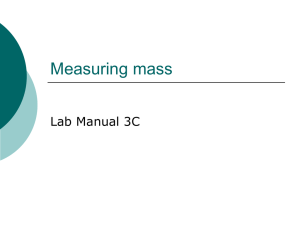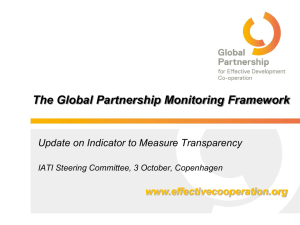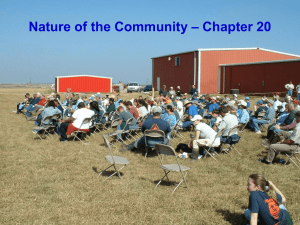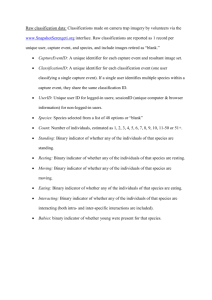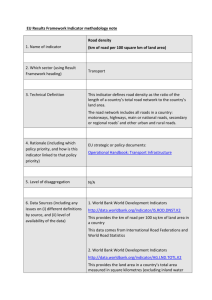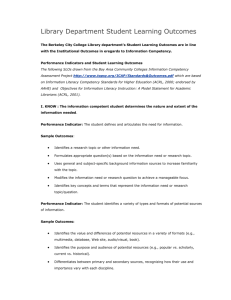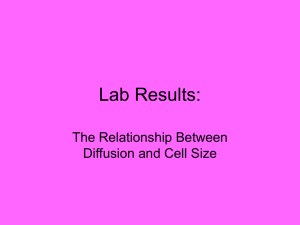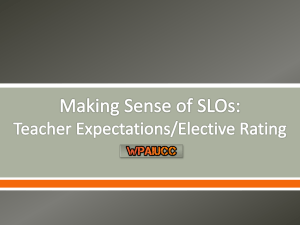KM competenices (WB) draft v.1
advertisement
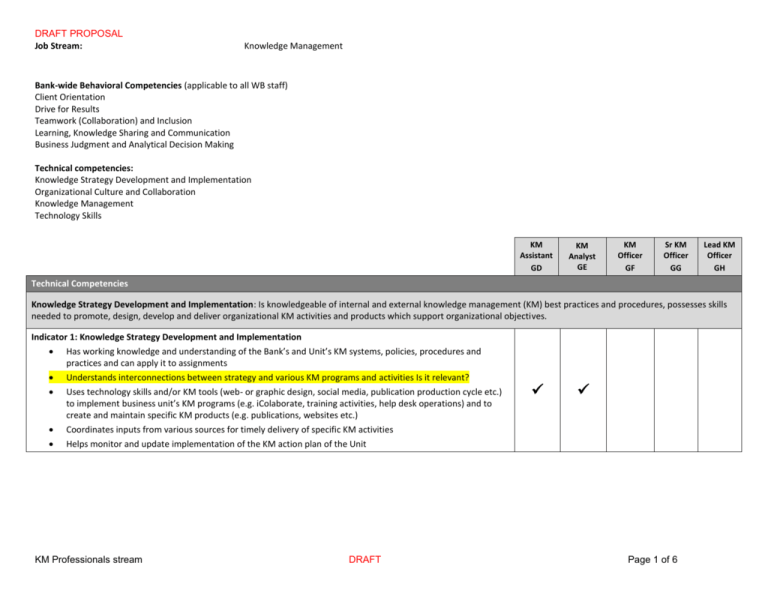
DRAFT PROPOSAL Job Stream: Knowledge Management Bank-wide Behavioral Competencies (applicable to all WB staff) Client Orientation Drive for Results Teamwork (Collaboration) and Inclusion Learning, Knowledge Sharing and Communication Business Judgment and Analytical Decision Making Technical competencies: Knowledge Strategy Development and Implementation Organizational Culture and Collaboration Knowledge Management Technology Skills KM Assistant GD KM Analyst GE KM Officer GF Sr KM Officer GG Lead KM Officer GH Technical Competencies Knowledge Strategy Development and Implementation: Is knowledgeable of internal and external knowledge management (KM) best practices and procedures, possesses skills needed to promote, design, develop and deliver organizational KM activities and products which support organizational objectives. Indicator 1: Knowledge Strategy Development and Implementation Has working knowledge and understanding of the Bank’s and Unit’s KM systems, policies, procedures and practices and can apply it to assignments Understands interconnections between strategy and various KM programs and activities Is it relevant? Uses technology skills and/or KM tools (web- or graphic design, social media, publication production cycle etc.) to implement business unit’s KM programs (e.g. iColaborate, training activities, help desk operations) and to create and maintain specific KM products (e.g. publications, websites etc.) Coordinates inputs from various sources for timely delivery of specific KM activities Helps monitor and update implementation of the KM action plan of the Unit KM Professionals stream DRAFT Page 1 of 6 DRAFT PROPOSAL KM Assistant GD KM Analyst GE KM Officer GF Sr KM Officer GG Lead KM Officer GH Technical Competencies Indicator 2: Knowledge Strategy Development and Implementation Assesses KM needs, demonstrates solid up-to-date knowledge of the KM systems, tools, architecture needed for effective implementation of KM activities and programs Is responsible for effective implementation of specific programs and activities that are part of the Unit’s KM strategy Reviews and screens relevant KM activities for consistency with Unit’s KM strategy, monitors their use, can assess impact of the KM activity Advises staff and management of the unit on KM topics, e.g. appropriate information organization and knowledge architecture Indicator 3: Knowledge Strategy Development and Implementation Independently conducts and updates KM needs assessment for the business Unit Determines and develops KM program strategy for business Unit and manages it’s implementation Develops complex KM programs and activities to generate, capture, disseminate and preserve knowledge Forecasts funding, technology and expertise needed to support KM strategy implementation, leverages existing resources or identifies opportunities to address gaps Maintains internal and external professional networks and affiliations and ensures that proven and emerging practices in the field of knowledge management are assessed for adopted for the organization Provides KM advice and counsel to senior staff across the department Indicator 4: Knowledge Strategy Development and Implementation Conducts and updates KM needs assessment for the VPU, other related units of the WB Group and external clients, identifies innovative approaches in meeting KM needs Understands organization, develops and articulates business case for KM Develops and fosters implementation of KM strategy for VPU Acts as a catalyst and empowers others to improve organizational KM capabilities in line with leading practices Provides strategic KM advice, creates effective means to incorporate KM into business processes to bring advantages of KM to Bank’s work Identifies and prioritizes investments and innovation needed, mobilizes resources necessary for implementation of KM strategy. Is it relevant? Organizational Culture and Collaboration: Promotes and champions organizational culture of knowledge sharing and collaboration. Possesses and maintains knowledge and skills related to collaboration across units, disciplines, and organizations. Fosters professional, knowledge and social networking. Champions development communities of practice, virtual and physical collaborative “structures”. KM Professionals stream DRAFT Page 2 of 6 DRAFT PROPOSAL KM Assistant GD KM Analyst GE KM Officer GF Sr KM Officer GG Lead KM Officer GH Technical Competencies Indicator 1: Organizational Culture and Collaboration Has ability to facilitate the adoption and use of knowledge sharing culture by answering questions and contributing to informal and formal training activities related to KM tools collaboration platforms Applies technical tools and platforms for community building (e.g. dedicated practice groups on iCollaborate etc.) Has ability to connect with people and engage various stakeholders into communities of practice activities Exhibits knowledge sharing and collaboration by participating in formal and inform KM community activities Utilizes networks, communities of practice and other sources to synthesize responses to queries Supports planning, organization and delivery of learning events and knowledge sharing activities Indicator 2: Organizational Culture and Collaboration Identifies, develops and fosters communities of practice by developing both, public and private community spaces Coordinates a thriving cycle of activities and events that allow for the members to regularly meet (face to face or via available media), reflect and evolve Advocates and role – models knowledge sharing in the unit Has ability to understand and engage diverse stakeholders and bring them together Is knowledgeable of the WB policies relevant to KM (e.g. information security policy etc.) and proactively interacts with colleagues and clients to ensure compliance with the policy Indicator 3: Organizational Culture and Collaboration Has solid understanding and practical experience in collaboration and community building activities Works with various groups of people to identify relevant communities of practice and facilitate creation and transfer of accurate and relevant knowledge and creation communities of practice Encourages and empowers others to facilitate knowledge sharing and collaboration Applies knowledge and experience in developing effective working relationships with professional societies, NGOs , think – tank experts and country clients to ensure flows of knowledge to and from the business unit Indicator 4: Organizational Culture and Collaboration Champions knowledge sharing and collaboration, empowers others to create knowledge sharing culture, deals sensitively in multi-cultural and multi-secotral environment Actively seeks and promotes out appropriate collaboration tools to aid and assist in sharing knowledge Creates, nurtures, and develops communities of experts in the sector/Network (TGs, GETs, others) Identifies and promotes suitable incentives, rewards and recognition methods to foster internal and external knowledge sharing and collaboration KM Professionals stream DRAFT Page 3 of 6 DRAFT PROPOSAL KM Assistant GD KM Analyst GE KM Officer GF Sr KM Officer GG Lead KM Officer GH Technical Competencies Knowledge Management: Possesses and maintains deep understanding of all stages of the Life Cycle of Knowledge, and all types of knowledge produced and consumed on the course of conducting WB business. Supports the creation and dissemination of knowledge through adequate channels and knowledge products. Possesses knowledge needed to measure and assesses effectiveness of the KM activities and products. Indicator 1: Knowledge Management Assists in maintaining and updating content of KM products, design, production, maintenance and dissemination of knowledge products, e.g. publications, newsletters, tip sheets, and websites Conducts basic sector research using Bank Libraries, on line resources and responds to quarries in written or oral form Has good editing, Tests KM products and service for effectiveness, quality and responsiveness Is it relevant? Assists with gathering basic level metrics related to the effectiveness of knowledge products (e.g. website hits, publication downloads, surveys) and preparing reports Indicator 2: Knowledge Management Demonstrates technology and design skills (e.g. multimedia and web design skills) to creatively “package” and disseminate knowledge products Has ability to analyze and synthesize information and “translate” knowledge content into audience appropriate language and advice on appropriate communication channels Is responsible for gathering basic level metrics to assess effectiveness of knowledge products (e.g. website hits, publications downloads) and prepares reports Indicator 3: Knowledge Management Proactively works with colleagues to assess KM tools and resources, knowledge gaps and needs Adequately captures and synthesizes knowledge and makes it available for re-use through effective knowledge products, e.g. through written stories, SmartLessons, video debriefings and other methods Demonstrates excellent writing, editing and communication/presentation skills which enable to provide oral and written knowledge products Monitors quality and effectiveness of knowledge products through surveys, evaluations, and statistics on utilization KM Professionals stream DRAFT Page 4 of 6 DRAFT PROPOSAL KM Assistant GD KM Analyst GE KM Officer GF Sr KM Officer GG Lead KM Officer GH Technical Competencies Indicator 4: Knowledge Management Creates and promotes the right conditions for knowledge to be created and used Guides colleagues on use of a wide portfolio of relevant quality knowledge products Identifies opportunities for knowledge products and acts as a catalyst to improve organizational capabilities in line with leading practices Designs and implements monitoring and evaluation approaches and indicators to measure outputs, outcomes and impacts of knowledge strategies and investment Technology Skills: Assesses a diverse array of options to foster knowledge organization by leveraging existing technology resources, tools and platforms. Advocates and leverages existing and emerging technologies and tools to improve knowledge management (KM) programs and products. Strategically applies technology-based KM solutions for optimal results for WBG staff. Indicator 1: Technology Skills Demonstrates basic awareness and practical experience in emerging KM related technologies and tools Provides support for implementation of KM programs and activities using one or more KM related tool and/or technology (e.g. web- or graphic design and management, social media, publication production cycle, data based development , e-publish tool or other) Has advance experience working with Microsoft application, e.g. has advanced Power Point skills Indicator 2: Technology skills Demonstrates broad working proficiency of technology and/or tools relevant to KM (web- or graphic design, social media or publication production cycle etc.) needed to support implementation of various KM programs and activities Implements appropriate KM tools and technologies to improve KM in the Bank Facilitates communication between subject matter experts and technology experts to design and implement relevant technology to promote knowledge creation, sharing and use Indicator 3: Technology skills Keeps up to date with newest technologies and applications which provide means to crate, share and use knowledge effectively Provides assessment and recommendations on relevant KM technological solutions and oversees it’s implementation Has ability to maintain active working relationship with systems/technology staff to convey relevant users requirements Supervises and monitors the quality of the work of outside vendors and/or STCs to develop relevant technology products that meet Bank needs KM Professionals stream DRAFT Page 5 of 6 DRAFT PROPOSAL KM Assistant GD KM Analyst GE KM Officer GF Sr KM Officer GG Lead KM Officer GH Technical Competencies Indicator 4: Technology skills Demonstrates broad understanding of and keeps up to date with newest technologies and applications relevant to KM, assesses it’s relevance to achieving results and promote knowledge organization Has the ability to effect technology change Promotes awareness and advocates for the use of current and emerging technologies Builds business case and advices management on use of appropriate technology solutions needed to reach business unit’s KM goals KM Professionals stream DRAFT Page 6 of 6
